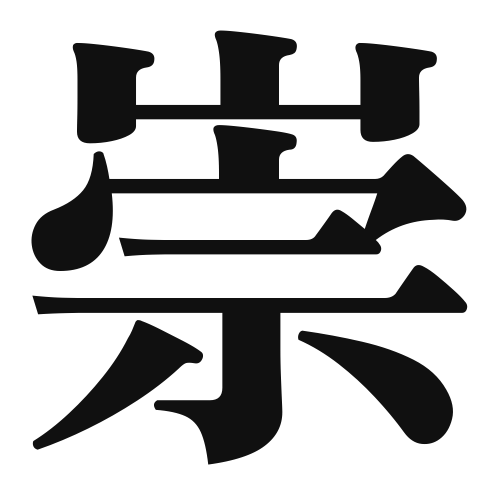1. Overview of Meaning
The kanji “崇” (sū) generally means “to revere,” “to respect,” or “to worship.” It conveys a sense of admiration or high regard for someone or something.
2. Formation and Radical
Formation of the Kanji: The kanji “崇” is a compound character, which means it is formed by combining different elements. It consists of the radical “山” (mountain) and the phonetic component “宗” (religion or sect). The mountain symbolizes height and elevation, suggesting something that is held in high esteem.
Radical: The radical of “崇” is “山,” which relates to mountains and elevation, reinforcing the idea of reverence and respect.
3. Examples of Usage
Common Words and Phrases: Some common words that include “崇” are “崇拝” (sūhai – worship) and “崇高” (sūkō – sublime or lofty).
Example Sentences in Daily Conversation:
- 彼は崇高な理想を持っている。 (Kare wa sūkō na risō o motte iru.) – He has lofty ideals.
- 私たちは彼の業績を崇拝しています。 (Watashitachi wa kare no gyōseki o sūhai shiteimasu.) – We revere his achievements.
4. Synonyms and Antonyms
Similar Kanji: A similar kanji is “尊” (son), which also means “to respect” but often carries a connotation of honor or dignity. While “崇” emphasizes reverence, “尊” focuses more on respect and esteem.
Opposite Kanji: An antonym of “崇” is “軽” (karu), which means “light” or “to treat lightly,” indicating a lack of respect or reverence.
5. Cultural and Historical Background
Relation to Japanese Culture: In Japanese culture, reverence is an important value, especially in the context of Shinto and Buddhist practices. The concept of “崇” is often associated with the respect given to deities, ancestors, and nature.
Proverbs and Idioms: One common saying is “崇高な精神” (sūkō na seishin), which translates to “sublime spirit,” reflecting the high regard for noble qualities in individuals.
